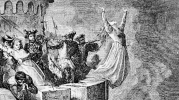bibliophile
Aktives Mitglied
Bin zwar kein Freund von Gedichten ,doch zufaellig las ich vor laengerer Zeit ein Sonnet von dem englischem Dichter John Milton "On the Late Massacre in Piedmont". Sein leidenschaftlicher Empoerungsausbruch ueber die Verbrechen, seine stark emotionellen Worte, diese wuetenden cris de cœur , lassen den Leser nicht unberuehrt. Oft denke ich an das Sonett. In der Tat, damals zu jener Zeit waren etliche Nationen ueber die Magnitude der Verbrechen so shockiert gewesen, sie ruettelten am 'Gewissen der Nationen.' (1)
Die Massaker an den Waldonen hatte sogar Debatten im britischen Parlaments bezueglich der East-Indian Co. beeinflusst (2)
Man kann ja auch ein Buch on line lesen, das viel Auskunft ueber die Waldenser gibt : "The Israel of the Alps. A complete history of the Waldenses and their colonies" (4)
Die letzte Linie im besagten Sonnet geht: "Early may fly the Babylonian woe."
Dieser Ausdruck ist mir voellig unbekannt. Ich kann mir zwar gut vorstellen vorstellen was er meint. Weiss einer von Euch mehr darueber?
(1) 'Gewissen der Nationen.' ist ein nach dem 2.WK entstandenes philosophisches Konzept.
(2) page 169
"The question of converting the natives of India to Christianity was at that time supposed to depend for its solution upon the origin of the massacre at Vellore, and Grant’s triumph proved to be the necessary preliminary to the insertion of a clause in the Charter Act of 1813,- which permitted the licensing of missionaries to introduce into India useful knowledge and religious and moral improvements. ........ East India Company : Philips, C.H. : Free Download, Borrow, and Streaming : Internet Archive
(3)
The East India Company : East India Company : Philips, C.H. : Free Download, Borrow, and Streaming : Internet Archive
(4)'The History of the Waldenses by James Aitken Wylie.... History of the Waldenses : Wylie, J. A. (James Aitken), 1808-1890 : Free Download, Borrow, and Streaming : Internet Archive
....................................................... byAlex Muston................. The Israel of the Alps. A complete history of the Waldenses and their colonies : Muston, Alexis : Free Download, Borrow, and Streaming : Internet Archive
Die Massaker an den Waldonen hatte sogar Debatten im britischen Parlaments bezueglich der East-Indian Co. beeinflusst (2)
Man kann ja auch ein Buch on line lesen, das viel Auskunft ueber die Waldenser gibt : "The Israel of the Alps. A complete history of the Waldenses and their colonies" (4)
Die letzte Linie im besagten Sonnet geht: "Early may fly the Babylonian woe."
Dieser Ausdruck ist mir voellig unbekannt. Ich kann mir zwar gut vorstellen vorstellen was er meint. Weiss einer von Euch mehr darueber?
"The Babylonian Exile is an infamous event of Jewish and Judeo-Christian history. The Babylonians invaded and destroyed the Temple of Jerusalem, but the religion endures. This allusion to the Babylonians’ taking advantage of the temple and the land is reflected here in the destruction of the bodies of the martyrs. Most Christian faiths hold the belief that a person’s body is a temple, sacred and to be well-kept. Additionally, many Protestants of Milton’s time identified the Catholic Church with Babylon and the Whore of Babylon in the book of Revelation [18] ..........https://sites.udel.edu/britlitwiki/on-the-late-massacre-in-piemont/"
________________________________________________________________________________________
"Das babylonische Exil ist ein berüchtigtes Ereignis in der jüdischen und jüdisch-christlichen Geschichte. Die Babylonier fielen ein und zerstörten den Tempel von Jerusalem, aber die Religion blieb bestehen. Diese Anspielung darauf, dass die Babylonier den Tempel und das Land ausnutzten, spiegelt sich hier in der Zerstörung der Leichen der Märtyrer wider. Die meisten christlichen Glaubensrichtungen vertreten die Auffassung, dass der Körper eines Menschen ein Tempel ist, der heilig ist und gut gepflegt werden muss. Darüber hinaus identifizierten viele Protestanten zu Miltons Zeiten die katholische Kirche mit Babylon und der Hure Babylon aus der Offenbarung [18]." ..........https://sites.udel.edu/britlitwiki/on-the-late-massacre-in-piemont/
(1) 'Gewissen der Nationen.' ist ein nach dem 2.WK entstandenes philosophisches Konzept.
(2) page 169
"The question of converting the natives of India to Christianity was at that time supposed to depend for its solution upon the origin of the massacre at Vellore, and Grant’s triumph proved to be the necessary preliminary to the insertion of a clause in the Charter Act of 1813,- which permitted the licensing of missionaries to introduce into India useful knowledge and religious and moral improvements. ........ East India Company : Philips, C.H. : Free Download, Borrow, and Streaming : Internet Archive
(3)
The East India Company : East India Company : Philips, C.H. : Free Download, Borrow, and Streaming : Internet Archive
(4)'The History of the Waldenses by James Aitken Wylie.... History of the Waldenses : Wylie, J. A. (James Aitken), 1808-1890 : Free Download, Borrow, and Streaming : Internet Archive
....................................................... byAlex Muston................. The Israel of the Alps. A complete history of the Waldenses and their colonies : Muston, Alexis : Free Download, Borrow, and Streaming : Internet Archive

